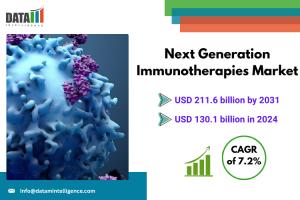Next-Gen Immunotherapies Market to Grow at 7.2% CAGR, During 2024-2031 | DataM Intelligence
The next-gen immunotherapies market is evolving with biotech advances, rising cancer cases, new therapies, funding, and global innovation driving growth.
The Next-generation immunotherapies market is undergoing a significant transformation as biotech innovations redefine how we fight complex diseases such as cancer, autoimmune disorders, and infectious diseases. Driven by personalized therapies, advanced cell engineering, and supportive regulatory pathways, the market is projected to grow at a CAGR of 7.2% in the coming years.
Market Drivers
Increasing global cancer prevalence is creating a strong demand for innovative treatment approaches
Significant progress in CAR-T and TCR-T cell technologies is reshaping the therapeutic landscape
Accelerated innovation in mRNA platforms and gene-editing tools is enhancing immunotherapy potential
Public sector investments and financial incentives are fueling immunotherapy research and trials
Strategic partnerships between biotech companies and research institutions are driving pipeline growth
Regulatory agencies are granting more approvals for advanced biologics and cell-based therapies
Get Premium Sample Report Pdf: https://www.datamintelligence.com/download-sample/next-generation-immunotherapies-market
Market Segmentation
By Immunotherapy Type - Monoclonal Antibodies, Immune Checkpoint Inhibitors, Non-specific Immunotherapies (Cytokines, Bacillus Calmette-Guerin (BCG)), Antibody Drug Conjugate, Cellular Therapy (T-Cell Therapy, B-Cell Therapy), Others
By Route of Administration - Oral, Parenteral
By Distribution Channel - Hospital Pharmacies,Online Pharmacies, Retail Pharmacies
Latest News of USA
The United States is leading the way in next-generation immunotherapy innovation. In early 2025, the FDA approved a groundbreaking CAR-T cell therapy developed by Gilead Sciences for the treatment of relapsed lymphoma, marking a pivotal moment in personalized cancer care. Meanwhile, Moderna announced a strategic partnership with Merck to co-develop a new mRNA-based cancer vaccine, now moving into phase II trials. Additionally, NIH launched a $150 million funding initiative to support early-stage biotech firms exploring TCR-T therapies and oncolytic virus platforms.
Latest News of Japan
Japan is rapidly advancing its role in the global immunotherapy market through both policy and innovation. In 2025, the Japanese government approved new reimbursement guidelines for CAR-T treatments, making them more accessible to cancer patients. Furthermore, Osaka University initiated Asia's first clinical trial for a CRISPR-based TCR-T therapy targeting pancreatic cancer. Japanese pharmaceutical giant Takeda is investing over $200 million to expand its immunotherapy R&D unit, with a focus on autoimmune conditions and novel checkpoint inhibitors.
Market Key Players
A number of prominent players are driving innovation and commercialization within the space. These include:
AstraZeneca
BioNTech SE
Boehringer Ingelheim International GmbH
Bristol-Myers Squibb Company
Gilead Sciences, Inc.
MacroGenics, Inc.
Mereo Biopharma Group PLC
Pfizer Inc.
Regeneron Pharmaceuticals Inc.
Sorrento Therapeutics
Many of these companies are actively engaged in mergers, licensing deals, and late-stage clinical trials to expand their therapeutic pipelines.
Key Developments:
Sept 11, 2023: Pfizer and BioNTech received FDA clearance for their Omicron XBB.1.5-adapted COVID-19 vaccine for ages 6 months and up.
Jan 9, 2023: 3T Biosciences and Boehringer Ingelheim partnered to co-develop advanced cancer therapies using the 3T-TRACE platform.
Conclusion
The next-generation immunotherapies market is on the brink of a revolutionary shift over the coming decade. As scientific breakthroughs align with regulatory support and increasing global healthcare needs, companies and countries are investing heavily to bring safer, more effective, and personalized treatments to patients. With strong market push in regions like the U.S. and Japan, the field is evolving beyond oncology into a wider spectrum of diseases marking a revolutionary shift in how medicine will be delivered in the future.
Related Reports
Immuno Oncology Assays Market Analysis 2025 - 2033
Antibody Drug Conjugates Market Size 2024 - 2031
Sai Kumar
DataM Intelligence 4market Research LLP
+1 877-441-4866
email us here
Visit us on social media:
LinkedIn
X
Legal Disclaimer:
EIN Presswire provides this news content "as is" without warranty of any kind. We do not accept any responsibility or liability for the accuracy, content, images, videos, licenses, completeness, legality, or reliability of the information contained in this article. If you have any complaints or copyright issues related to this article, kindly contact the author above.
غرينبيس الشرق الأوسط وشمال أفريقيا ومدرسة المناخ تُكرّمان روّاد الصحافة المناخية في أول جائزة إعلامية من نوعها بالمنطقة
Global Mailer Packaging Market to Reach USD 14.35 Billion by 2035, Driven by E-Commerce and Logistics Boom | FMI
Caton Delivers Flawless Live IP Transmission for EVO Japan 2025
Kalendarium
Więcej ważnych informacji
 Jedynka Newserii
Jedynka Newserii

 Jedynka Newserii
Jedynka Newserii

Polityka

Parlament Europejski przeciwny centralizacji polityki spójności w UE. Apeluje o jej większą elastyczność
Parlament Europejski sprzeciwia się pomysłowi centralizacji zarządzania polityką spójności w Unii Europejskiej. W maju br. większością głosów przyjął sprawozdanie na temat spójności gospodarczej i społecznej i jej przyszłości po 2027 roku. Zdecydowana większość grup politycznych jest za decentralizacją modelu polityki spójności, mówiąc stanowcze „nie” ograniczeniu roli władz regionalnych i lokalnych. Jednocześnie wskazuje na potrzebę uelastyczniania tej głównej polityki inwestycyjnej tak, by sprawnie można było reagować na ewentualne kryzysy i nowe wyzwania.
Bankowość
Globalny sektor finansowy mocniej otwiera się na blockchain. Nowe regulacje likwidują kolejne bariery na rynku

Coraz więcej banków i instytucji finansowych inwestuje w technologię blockchain. To przede wszystkim szansa na zwiększenie bezpieczeństwa transakcji, ich prywatności, ale też nowe możliwości weryfikacji tożsamości oraz przechowywania wartości. Jedną z najbardziej zaawansowanych platform opartych na technologii blockchain jest Ethereum – zdecentralizowany system umożliwiający tworzenie i wykonywanie smartkontraktów oraz aplikacji rozproszonych. O ile klasyczne łańcuchy bloków pełnią funkcję zdecentralizowanego rejestru transakcji, o tyle Ethereum wprowadza warstwę logiki wykonawczej, czyniąc z blockchaina uniwersalną platformę kontraktów samowykonalnych i aplikacji rozproszonych.
Konsument
Po debacie prezydenckiej wzrosło zainteresowanie woreczkami nikotynowymi. Niesłusznie mylone są z nielegalnymi w Polsce snusami

Debata prezydencka 23 maja br. pokazała, że Polacy nie wiedzą, czym są saszetki nikotynowe oraz snusy, a także czym się różnią. Sztab wyborczy Karola Nawrockiego podał, że kandydat na prezydenta podczas debaty przyjął snus. Sam Karol Nawrocki sprostował, że była to saszetka nikotynowa. Tymczasem różnica między oboma produktami jest ogromna. Snus zawiera tytoń, którego nie ma w saszetce, a jego sprzedaż w UE – z wyjątkiem Szwecji – jest zabroniona.
Partner serwisu
Szkolenia

Akademia Newserii
Akademia Newserii to projekt, w ramach którego najlepsi polscy dziennikarze biznesowi, giełdowi oraz lifestylowi, a także szkoleniowcy z wieloletnim doświadczeniem dzielą się swoją wiedzą nt. pracy z mediami.









.gif)

 |
| |
| |
|